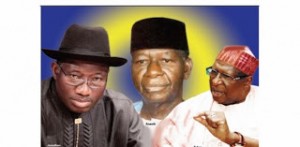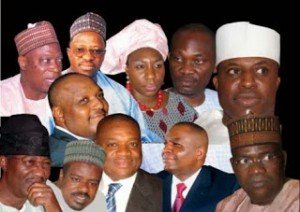

If you wake up President Goodluck Jonathan in the middle of the night and ask him why wants to remain in office until 2019, he will probably mumble something about his constitutional right to seek a second term in office.
You will not hear anything about transforming Nigeria into a leading economic and political anchor in the world, nor will you hear about any plans of tapping into Nigeria’s exceptionally talented people to create an economic and cultural hub Africa will be proud of.
What is becoming increasingly clear is that Jonathan is hostage to an ambition that is not his, perplexed by politics he does not understand, and in charge of a government over which he has no control. The results of these triple tragedies is that he has been unable to grasp the complexities required in managing a country like Nigeria and therefore has no dreams, no ambitions and no plans.
Except for those who took billions of naira for doing nothing in the name of fuel subsidies or who simply steal crude oil from the creeks, and those that arbitrarily award multi-million dollar contracts to buy armored cars, the reality for most Nigerians since Jonathan took office has been insecurity, poverty, unemployment and growing ethnic and religious tensions.
Contrary to what loudmouths like Doyin Okupe would have Nigerians believe, opposition to this government is not borne out of dislike for the president, though Jonathan’s emerging hauteur in response to serious national crises have not helped matters. The angst stems from the president’s inexcusable, almost criminal squander of opportunities and evident reluctance to deal with crises of governance while devoting inordinate amounts of time, energy and resources to the politics of 2015.
Though the next presidential election is still over a year away, the gadflies around the president and the ruling People’s Democratic Party (PDP) have begun a macabre dance around the bonfire of Jonathan’s reelection plan. The intention is as clear as daylight: facilitate the continuance of a weak government so that a few people in the corridors of power can continue to milk the system – a convenient arrangement for the president to continue with what seems to be a mission to leave Nigeria prostrate.
The president’s attitude to the ongoing strike by varsity lecturers is a window into how his mind works: For a former academic to display such disregard for the plight of his former colleagues and their fight to improve university education speaks volumes of the character of the president.
Not surprisingly, just as he came into office without an agenda, Jonathan’s style of governance and even reelection bid is not anchored on any plan. He wants to contest simply because he can, hostage to an ambition that is not his and prisoner to interests from he cannot break free.
While teachers, doctors, nurses and many other professionals are permanently on strike or threatening strike action; while unemployment has risen to record levels; while the security situation has deteriorated; while corruption permeates government and stinks to high heavens, all that is on Jonathan’s mind is the desire to remain in office beyond 2015 despite his inability to steer the ship of state.
Ironically, rather than expand so much energy and resources to fight for reelection that almost seems to be around the corner, all Jonathan needed to have done since becoming president was to deliver on some of the most pressing challenges confronting Nigeria and Nigerians. What he needed to have was to institutionalize good governance, rule of law, arrest impunity and give hope to Nigerians.
Obviously, these issues were never Jonathan’s priority, assuming he had any, before and since becoming president. It does not require a genius to discern that in a free and fair vote, it would be impossible to see Nigerians electing to keep this man in office.
So assuming that the opposition manages to get its acts together and exploits the massive public disappointment to defeat the president and his cohorts, does the electorate have the sophistication to insist that good governance – the exercise of economic, political and administrative authority to better manage affairs of a country – must drive the new government?
This poser is important because there is a danger that years of poverty and suffering have so emasculated Nigerians that issues like full respect of human rights, the rule of law, effective participation, political pluralism, transparent and accountable processes and institutions and an efficient and effective public sector have merely become unobtainable ideals and secondary issues in the brutal fight to simply stay alive.
The point is, as 2015 approaches, it is time for Nigerians to bring new energy into the political fray and engage hitherto disinterested groups to shape the direction of the country.
At the minimum, Nigerians must seek to reclaim their country and rescue their dreams by electing parties and candidates that have clear and purposeful sense of ambition, drive and leadership.
dude lets work on this cultural hub.